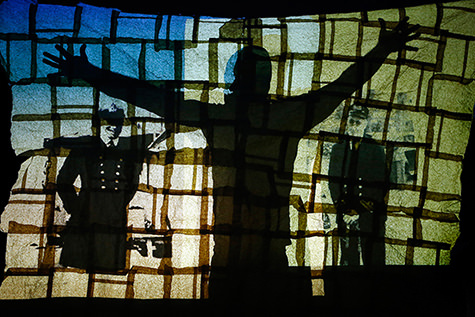PIAF 2016: A personal sharing
Jonathan W. Marshall: James Berlyn, I Know You’re There

I Know You’re There, James Berlyn
image courtesy the artist and PIAF 2016
I Know You’re There, James Berlyn
James Berlyn is a charming host. He greets spectators singly before inviting us to sit about a large, paper-wrapped round table accommodating up to 20 guests. He joins us, periodically moving between four positions located among our seats. He is an engaging speaker, leaning deeply across the board, shoulders typically slightly hunched, long arms pivoting on the tabletop as wide hands splay out at chest level.
Berlyn trained in dance before switching to acting, and some of the most beautiful moments in the work occur at the conclusion when he leaves the table to dance behind each of four paper panels located behind us. His movement is supple, a collection of relatively straightforward gestures and gentle, balletic arcs in which the physical accent is relaxed and free. Its unadorned kinaesthesia made this one of my favourite sections, although Berlyn was only visible in shadow throughout. When spinning, his arms outstretched at shoulder level, the shadow produced deformations of his limbs, making the artist’s hands appear to squash grotesquely into his torso—not an image of achievement.
Berlyn’s direct, generous delivery is the piece’s principal focus, largely to the exclusion of other elements. I Know You’re There is an act of storytelling, a text spoken aloud by an empathetic subject directly to his audience. To a degree, Berlyn plays with light and props. A ball of paper is passed about the audience, individually unfolded by each of us; we are then invited to tear it into a ribbon. Berlyn places four small LED torches at each of his stations. He raises one to represent a Russian satellite passing far above his child self; another becomes a miniature puppet of himself. In a memorable display of personal trauma, he points a torch deep down his throat. These are however minor flourishes in an otherwise very wordy piece.
Berlyn’s tale is that of his life, and more particularly his vexed yet loving relationship with his father and his own not always successful career in the arts. The story is not especially new. Oedipal stories of rivalry and fractured relations between fathers and sons is a constant of Western dramaturgy up to Star Wars. His father is both metaphorically and literally distanced from the son in this age-old tale. In a pleasingly melancholy touch, we hear a recording of the absent father playing guitar for Berlyn’s mother in an audio letter made at sea. The striking marginalisation of his mother elsewhere is unfortunate, since stories about men and mothers—particularly when not cast as the smothering maternal archetype of US film and TV—are less common. None of this is to say that Berlyn’s story is not a good one, nor not well told, but its form is familiar. This is a classic humanist narrative of coming to terms with oneself and overcoming obstacles in order to like the skin one is in. Berlyn tells this well and with generosity, if not novelty.
Also problematic is a reference to what Berlyn calls “the big pink elephant in the room.” He tells us he once repeatedly engaged in unsafe sex in Sydney in the 80s seeking death through AIDS. This lone allusion to Berlyn’s sexual identity creates a perplexing lacuna within a performance otherwise based on personal revelation.
For those seeking a direct, one-on-one empathetic relationship with a charismatic speaker in an intimate setting, I Know You’re There is highly rewarding. Having attended numerous intimate performances (Lloyd Jones’ superb Seven Brides For Seven Brothers in Seven Audience Parts at Melbourne’s La Mama, 1997, comes to mind), I found this one offered few surprises, with Berlyn’s physical performative strength marginalised in favour of words.
At one point Berlyn cites a moment from a work by Pina Bausch and director Jim Hughes claims her work inspired I Know You’re There. However, the rich physical dramaturgy of Bausch and Raimund Hoghe is not in evidence. I Know You’re There is in fact closer to Jacques Le Coq and John Bolton in its open-handed dependence on principles of verbal honesty supported by a simple, relaxed physical presence close to ‘clown’—Berlyn gently mugs and emotionally fails, and we love him for it. The work appeals to those with an empathetic narrative bent, who see the origins of Western theatre not in the affronting frenzy of Bacchus’ writhing priestesses so superbly evoked in Bausch’s Rite of Spring (1975) but rather in personal identification with characters described in the texts of the once recited epics of Homer and Virgil. For the latter, I Know You’re There succeeds.
–
Perth International Arts Festival 2016: I Know You’re There, creator, performer James Berlyn, director Jim Hughes; State Theatre Centre, Feb 19-Mar 6
RealTime issue #131 Feb-March 2016






